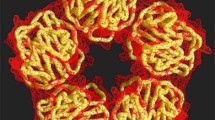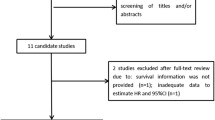Abstract
The aim of our study was to determine the rate of elevation of c-reactive protein in cancer patients and to evaluate its correlation with other acute phase proteins. A total of 104 patients with various types of cancer who admitted clinic were included in our study. Serum levels of c-reactive protein, lactate dehydrogenase, ferritin, haptoglobin, plasma fibrinogen levels and erythyrocyte sedimentation rate were measured. The serum levels of c-reactive protein was found to be increased in 74% of cancer patients, with 81.3% and 64.4% in metastatic and non-metastatic group, respectively. Our study showed that c-reactive protein and fibrinogen demonstrated better characteristics than other acute phase proteins to differentiate between cancer patients and healthy individuals and also to differentiate between healthy individuals and patients with infection. C-reactive protein, ferritin, fibrinogen, erythrocyte sedimentation rate, and haptoglobin showed similar characteristics to differentiate metastatic and non-metastatic cancer patients whereas, LDH demonstrated the lowest performance. C-reactive protein was not found to be superior to other acute phase proteins in the differential diagnosis of cancer and infection and in differentiating early stage disease from advanced stage.




Similar content being viewed by others
References
Koc M, Taysi S, Sezen O, Bakan N. Levels of some acute-phase proteins in the serum of patients with cancer during radiotherapy. Biol Pharm Bull 2003;26(10):1494–7.
Mcmillan DC, Canna K, McArdle CS. Systemic inflammatory response predicts survival following curative resection of colorectal cancer. Br J Surg 2003;90(2):215–9.
Zhang S, Buring J, Lee I, Cook N, Ridker P. C-rective protein levels are not associated with increased risk colorectal cancer in women. Ann Intern Med 2005;142(6):425–33.
Wigmore SJ, McMahon AJ, Sturgeon CM, Fearon KCH. Acute phase protein response, survival and tumour recurrence in patients with colorectal cancer. Br J Surg 2001;88(2):255–60.
Wieland A, Kerbl R, Berghold A, Schwinger W, Mann G, Urban C. C-Reactive protein as tumor marker in pediatric and adolescent patients with Hodgkin disease. Med Pediatr Oncol. 2003;41(1):21–5.
Kallio R, Bloigu A, Surcel HM, Syrjala H. C-reactive protein and erythrocyte sedimentation rate in differential diagnosis between infections and neoplastic fever in patients with solid tumors and lymphomas Support Care Cancer 2001;9(2):124–8.
Nozoe T, Matsumata T, Kitamura M, Sugimachi K. Significance of preoperative elevation serum c-reactive protein as an indicator for indicator for prognosis in colorectal cancer Am J Surg 1998;176(4):335–8.
Koenig W, Sund M, Fröchlich M, Fischer H, Löwel H, Döring A, Hutchinson W, Pepys M. C-reactive protein, a sensitive marker of inflammation, predicts future risk of coronary heart disease in initially healthy middle aged men Circulation 1999;99(2):237–42.
Nikiteas N, Tzanakis N, Gazouli M, Rallis G, Danilidis K, Theodoropulos G, Kostakis A, Peros G. Serum IL-6, TNF-α and CRP levels in colorectal cancer patients: prognostic implications World J Gastroenterol 2005;11(11):1639–43.
Child JA, Cooper EH, Ilingworth S. Biochemical markers in Hodgkin’s disease and non-Hodgkin lymphoma Recent results Cancer Res 1978;64:180–9.
Legouffe E, Rodriguez C, Picot MC. C reactive protein serum level is valuable and simple prognostic marker in non-Hodgkin lymphoma Leuk Lymphoma 1998;31(3–4):351–7.
Tartour E, Deneux L, Mosseri V. Soluble interleukin-2 receptor serum level as a predictor of locoregional control and survival for patients with head and neck carcinoma: results multivariate prospective study Cancer 1997;79(7):1401–8.
Nakano T, Chanabian AP, Shinjo M. Interleukin 6 and its relationship to clinical parameters in patients with malignant pleural mesothelioma Br J Cancer 1998;77(6):907–12.
Inoue T, Hashimura T, Iwamura H. Multivariate analysis of prognostic analysis of prognostic determinants after surgery for renal cell carcinoma at Himeji National Hospital. Hinyokika Kiyo 2000;46(4):229–34.
Masuda H, Kurita Y, Fukuta K. Significant prognostic factors for 5-year survival after curative resection of renal cell carcinoma. Int J Urol 1998;5(5):418–22.
Wechsel HW, Feil G, Lahme S. Control of hepatic parameters in renal cell carcinoma by interleukin-6? Anticancer Res 1999;19(4A):2577–81.
Zaloudik J, Lauerova L, Janakova L. Significance of pretreatment immunological parameters in colorectal cancer patients with unresectable metastases to the liver. Hepatogastroenterology 1999;46(25):220–7.
Barber MD, Powell JJ, Lynch SF. Two polymorphisms of tumor necrosis factor gene do nor influence survival in pancreatic cancer Clin Exp Immunol 1999;117(3):425–9.
Ljunberg B, Grankvist K, Rasmuson T. Serum Interleukin -6 in Relation to Acute-phase reactants and survival in patients with renal cell carcinoma. Eur J Cancer 1997;33(11):1794–8.
Bien E, Balcerska A. Clinical significance of erythrocyte sedimentation rate, C reactive protein and serum lactate dehydrogenase levels in the diagnosis, prognosis and treatment monitoring of children suffering from cancer. Med Wieku Rozwoj, 2004;8(4):1081–9.
Latif Z, Mcmillan DC, Wallace AM, Sattar N, Mir K, Jones G. The relationship of circulating insulin like growth factor 1, its binding protein-3, prostate specific antigen and C-reactive protein with disease stage in prostate cancer BJU International 2002;89(4):396–9.
Salawu L, Durosinmi MA. Erythrocyte sedimentation rate and plasma viscosity in health and disease. Niger J Med 2001;10(1):11–3.
Alexandrakis MG, Passam FH, Ganotakis ES, Sfiridaki K, Xilouri I, Perinakis K, Kyriaoku DS. The clinical and prognostic significance of erythrocyte sedimentation rate(ESR), serum interleukin -6(IL-6) and acute phase protein levels in multiple myeloma. Clin Lab Haematol 2003;25(1):41–6.
Miyata Y, Shigehiko K, Nishikido M, Noguchi M, Kanda S, Hayashi T, Saito Y, Kanetake H. Predictive values of acute phase reactants, basic fetoprotein and immunosuppressive acidic protein for staging and survival in renal cell carcinoma. Urology 2001;58(2):161–4.
Author information
Authors and Affiliations
Corresponding author
Rights and permissions
About this article
Cite this article
Bolayırlı, M., Turna, H., Orhanoğlu, T. et al. C-reactive protein as an acute phase protein in cancer patients. Med Oncol 24, 338–344 (2007). https://doi.org/10.1007/s12032-007-0012-1
Received:
Accepted:
Published:
Issue Date:
DOI: https://doi.org/10.1007/s12032-007-0012-1




